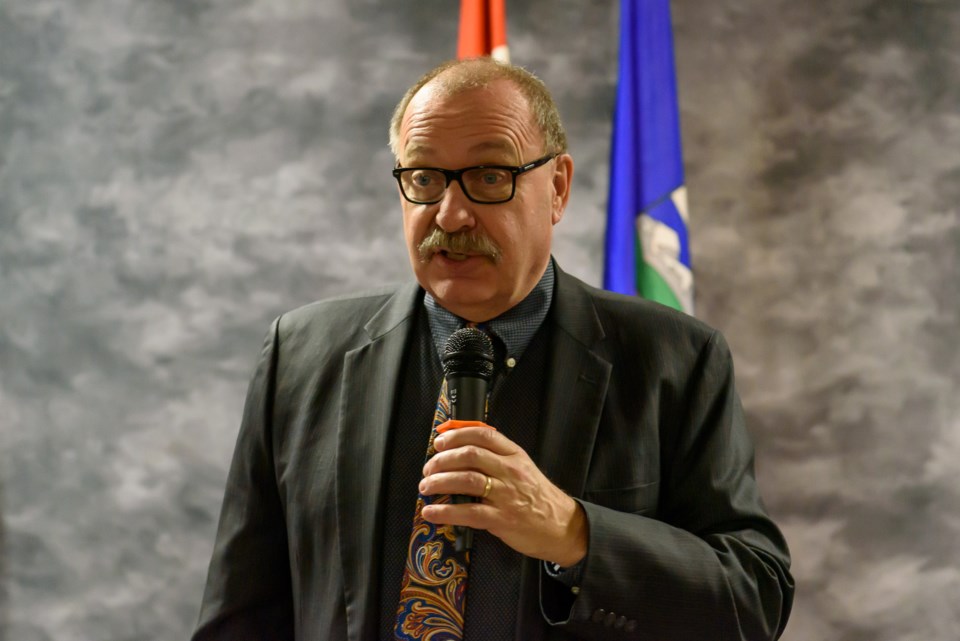Alberta Municipal Affairs Minister Ric McIver may say he recognizes the good work done by the regional planning boards he defunded last week, but St. Albert Mayor Cathy Heron doesn’t buy it.
Heron said Nov. 28 she is “disappointed, with capitals on all those letters,” the province is eliminating the remaining $1 million of its annual contribution to the Edmonton Metropolitan Regional Board (EMRB).
“It’s disappointing that all the good stuff that we’ve done is not being recognized, and I know the minister will say he does recognize it, but I don’t believe that,” she said.
Heron and the mayors of the EMRB’s other 12 member municipalities serve as EMRB directors. In fact, Heron is in the near future to present St. Albert’s new and non-compliant Northeast Area Structure Plan (ASP) to that group and ask they amend the EMRB’s own growth plan to allow for it.
Heron said she was “shocked” by the news, especially since there wasn’t any warning at an EMRB meeting a week earlier. To the contrary, she said they had good (and separate) discussions about housing and homelessness, and the University of Alberta Hospital.
“Nothing's in my calendar for Friday, and then I get this emergency meeting with the minister at 3 p.m. on Friday afternoon,” Heron said. “And the rumour mill starts going and we heard through the grapevine that he had met with the Calgary regional board that morning and gave them the same news he gave us, which is essentially, 'no more funding.'”
So EMRB directors had more of a heads up than their southern counterparts, but Heron said they were still “jaws on the floor” on the call.
The mayor said the EMRB, with mandatory participation dictated by the province, was further ahead in its work than the Calgary board because theirs was always voluntary, creating a revolving-door effect.
Among other initiatives, the EMRB has its growth plan and “birthed” Edmonton Global, which St. Albert council voted to remain a part of last month. Heron also highlighted a housing strategy that’s soon to be released.
Historically, the EMRB’s $4 million per year budget was split between the province and the 13 members. A previous halving of the contribution from Municipal Affairs had the directors working on a $4 million plan with $3 million in revenue.
They lobbied the Treasury Board to fill that $1 million gap to allow their work to continue without decimating their savings account.
“But they didn't fund us, which I was very surprised (by), to tell you the truth," Heron said. "A million bucks in the provincial budget is pennies.”
The changes comes almost exactly a year after the release of a report by consultants MNP that showed the EMRB had saved the province $6.5 million since 2017. It has also created $12 million in savings through efficiencies; for example, with an in-house modelling system that generates a regional transportation project priority list for funding consideration by the province, saving each member municipality from creating their own and eliminating potential conflicts.
Also, as part of a regional planning board, members are spared the provincial requirement of creating two types of plans to co-ordinate growth with neighbours.
If the EMRB implodes, St. Albert would have to go about creating such agreements with Edmonton and Sturgeon County. Heron said the cost for those plans can run into the seven figures.
She said the budget shortfall could have been solved among the member mayors, maybe by increasing their own contributions. But the change to making the board voluntary “is the real risk.”
Heron worries the counties in particular may be less likely to be told how to develop land within their borders and could leave, causing a similar challenge to remaining Edmonton Global members left with increasing dues payments to justify to taxpayers.
She also worries without the density benchmarks set by the regional growth plan, sprawl could prevail, eating up valuable farmland and costing more to service than infilled developments.
“The only reason that this region is doing it is because we're mandated to by a growth plan,” Mayor Heron said. “So now that it's going to be voluntary, there's a lot up in the air: What happens to that growth plan and all the good work we've done? We've spent millions of dollars getting to this place and time, that I feel like it's just going to be flushed down the drain now.
“I'm worried.”
Heron said she hopes an emergency meeting is called soon, so the board can sort out how they intend to proceed.
In emailed statement, McIver said the metropolitan boards were always supposed to eventually fund themselves.
“That is why funding has always been single-year,” he said. "The boards have worked hard. We are hopeful that they will choose to continue to work together to responsibly plan and manage development.
“Our government is open to suggestions on how each board can work collaboratively. We look forward to their ideas as we move forward.”




